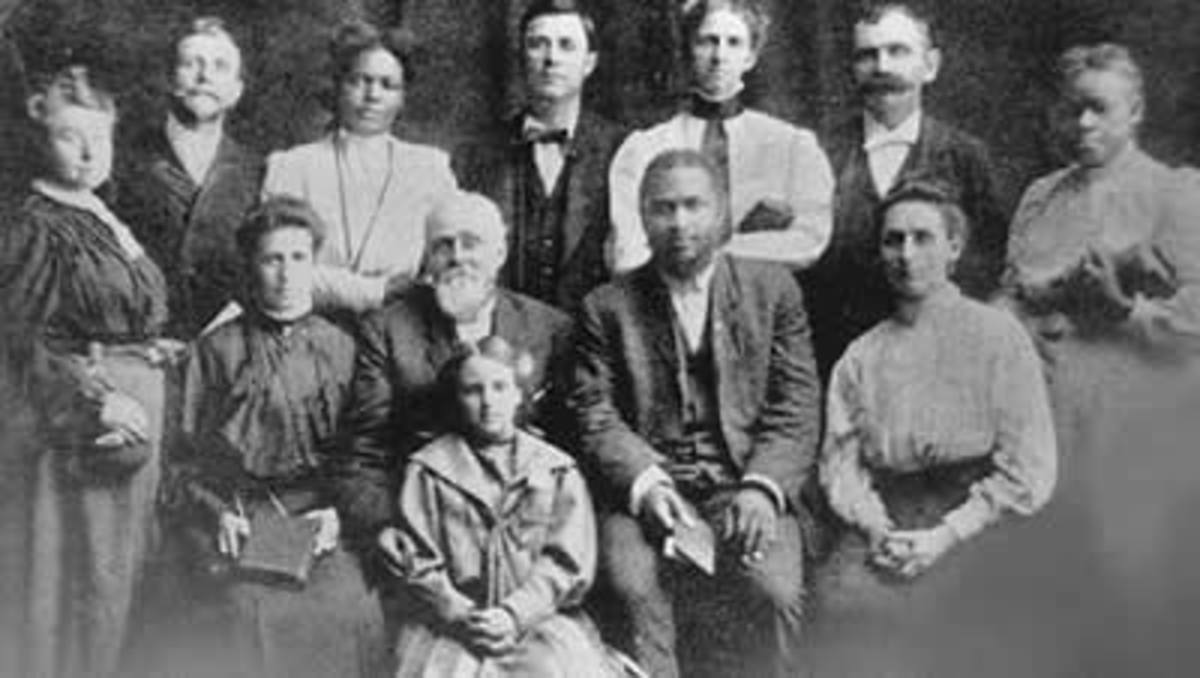Are We All Things to All Men as was Paul

How Do We Become All Things to All Men
1 Corinthians 9:19-23 (KJV)
19For though I be free from all men, yet have I made myself servant unto all, that I might gain the more. 20And unto the Jews I became as a Jew, that I might gain the Jews; to them that are under the law, as under the law, that I might gain them that are under the law; 21To them that are without law, as without law, (being not without law to God, but under the law to Christ,) that I might gain them that are without law. 22To the weak became I as weak, that I might gain the weak: I am made all things to all men, that I might by all means save some. 23And this I do for the gospel's sake, that I might be partaker thereof with you.
What did Paul mean when he said that he became all things to all men?
In this most interesting passage, his summation after he describes his goal and those people whom he wanted to reach, did Paul mean simply that he would use their own beliefs and ways to show them the truth? Did Paul mean that he became all things to all men for evangelism? So to a religious Jew he would use the law to speak to them, to a gentile he would use his conscience and culture, to a drug user he would be a drug user, to a prostitute he would be a prostitute, etc, etc? What do you think and what have you been taught? Do you think what you’ve heard before makes sense? Let’s look a bit closer and try to decipher what exactly it was that Paul was trying to tell us.
Many people think that he just adapted his teaching to their thoughts in their culture to reach them. While he divides the world into the religious with the law (Jews), and those without the law (Gentiles), there was not really to him a big difference as he comments elsewhere that there is neither Jew nor Greek. We are all created in the likeness of God.
What we see here in this passage has to be seen in relation to the belief in the existence of God and that we exist within His existence. Without this viewpoint we are lost to properly try and understand it and it is obvious that the translators for the most part were ignorant of this concept.
What is throwing the translators off is their obvious focus on “the Law” as a written document, which we know as the Old Testament or the Tanakh. While the word Law is one point, it is not the only point in the text and they forget to see how the particles and prepositions interact within the passage. It is here that we should look for the final answer.
First of all we have to see the words “free and servant”. In Hebrew, these words meant freeman as a Roman citizen, but that he was a voluntary bondservant of YHWH sent to all men and he is now duty bound to be and do what God wants him to do within the bounds of the Gospel of God as described in Romans in order to bring them salvation.
Salvation. How does Paul bring salvation and thereby “gain” all men. Well, what is salvation? Salvation in most Christian circles has meant nothing more than going to heaven by accepting Jesus, not withstanding all the 30,000 denominational variations on what it is supposed to mean. However, properly it means to come into a state of being. A state whereby we exist within the totality of all that God and Yeshua is. Not that we are them, but we exist within them. We become one in purpose and deed. We experience wholeness, rest, health, peace, joy, etc, and all the fruit of the spirit as a by product of where we are existing.
The translators had already messed up by this point and they came to this word “weak” and didn’t understand its use in 1st century Judaism. Weak in Hebrew in Jesus’ day meant prostrate ready to die, someone who was weak unto the point of death. Now, you tell me how Paul was going to get weak to the point of death in order to save someone? This makes absolutely no sense does it? So what was Paul talking about?
Let’s look at the final key to understanding this passage and one that has been wholly mistranslated and has led to all this confusion. That word is a small word in Hebrew הכל hakol or “all”. However, in Hebrew this word can have an adverbial meaning that is generally not thought of and that is the word in English “totality”.
Only when we look at this word correctly and then re-look at the entire passage does it all fall into place. Here is a brief retranslation:
19For though I am not a slave to any man, yet have I made myself a bondservant of YHWH, sent to serve all, that I might bring the manifestation of salvation to a greater number. 20And unto the Jews I exist within YHWH as the totality of all that the Jew is and needs, that I might bring the manifestation of salvation to the Jews; to them that are under the authority of the law, I exist within YHWH as the totality of all that those under the authority of the Law are and need, that I might bring the manifestation of salvation to them that are under the authority of the Law; 21To them that are without the authority of the Law, I exist within YHWH as the totality of all that the one who is without the authority of the Law is and needs, (existing not without law to God, but under the authority of the law of the Messiah,) that I might bring the manifestation of salvation to them that are without the authority of the law. 22To the prostrate and sickly even nigh unto death I exist as the totality of all that the sick needs, that I might bring the manifestation of salvation to those that are sick and dying: The Totality of all that the Law is to all men is how I exist so that I might by all means of God’s existence bring the manifestation of salvation to some. 23And this I do for the good news of God and the good news of Yeshua’s sake, that I might receive my reward from YHWH along with you.
In short one may say it like this, "Whatever a person is in need of, by virtue of me being in a unified state of existence and purpose with God and the Messiah, who is the totality of the Law, I am able to meet their need because I have the mind and power of God flowing out from me that can meet that need.
If this passage is mistranslated and taken out of context from the rest of Scripture an English reader may assume that Paul was willing to do anything to reach the lost, including adopting their lifestyle and compromise his ethics, moral and beliefs. This is a pernicious doctrine that has been popularized among certain nutty evangelistic groups today. If we use this logic then one cannot reach a drug addict unless they become one, one cannot reach a drunk unless they drink alcohol.
So when we look at Scripture in Hebrew, we find that Paul did not mean this. Paul taught that believers are to “abstain from any appearance of evil” (1 Thess. 5:22). Paul would not have done anything contrary to the good news of God or Yeshua in his ways in his own life or ministry.
Paul’s liberty in his existence and evangelism was not a freedom to serve the flesh in any way. Paul was always strict in regard to sin and he did not allow anything in his life that would bring the result of sin by spiritual carelessness.
So Paul did not mean that we act one way with one group of people and another way with another group. What he meant was that we exist every day as the totality of all that any person has needs within the existence of YHWH and Yeshua.
For more reading on the existence with God I would recommend you read:
Who Is the End Time Church? Recognizing the Spirit Realm by Dusty Farrell available on Amazon in Book or Kindle
Roy Blizzard's New Book









